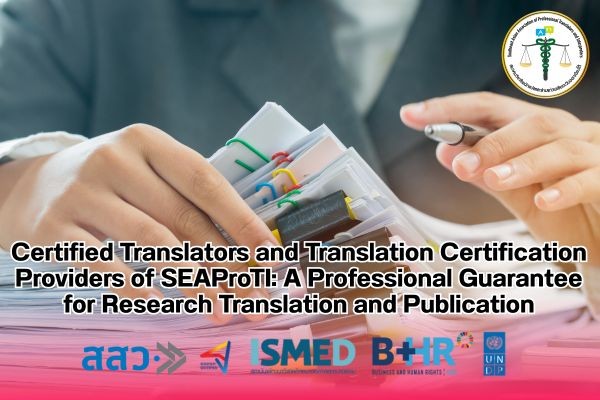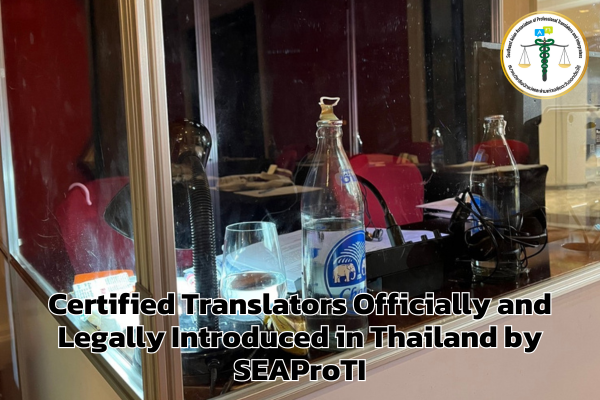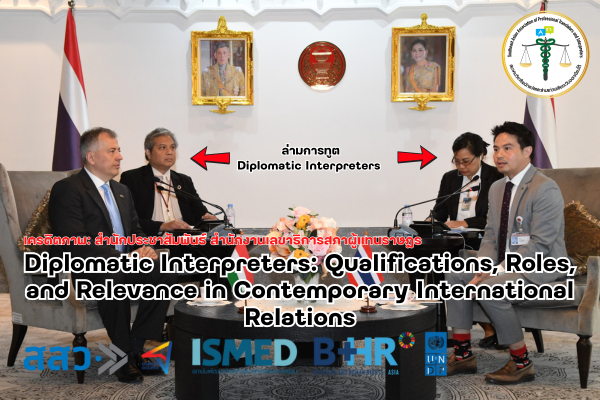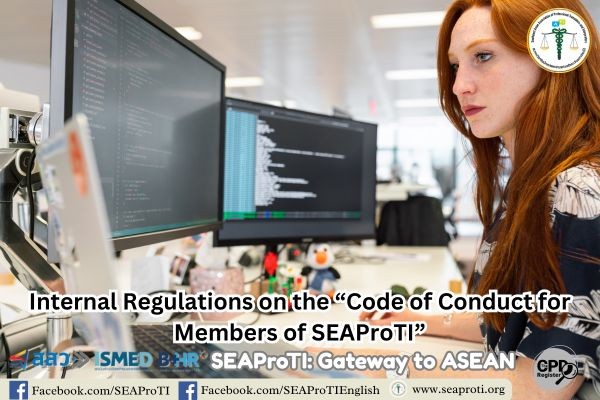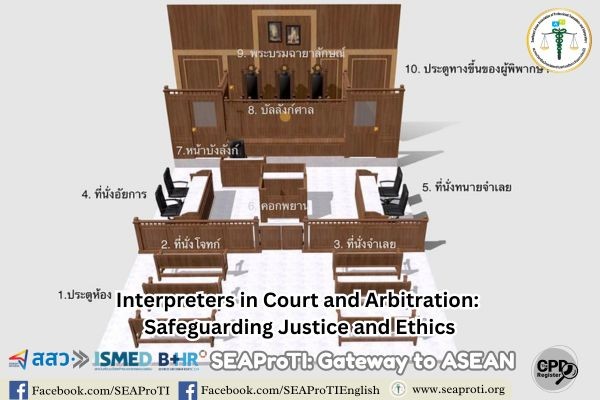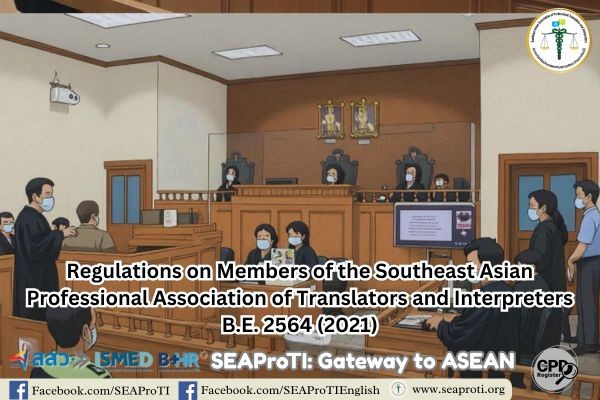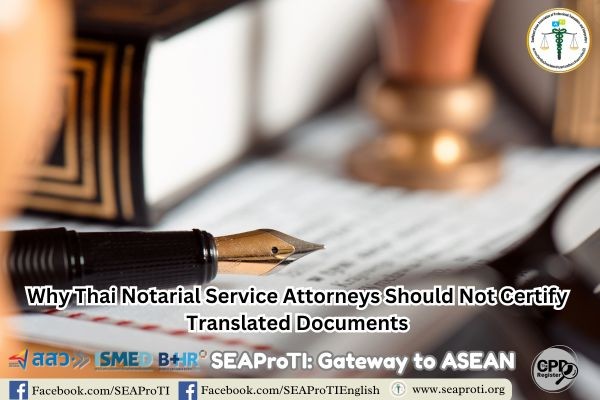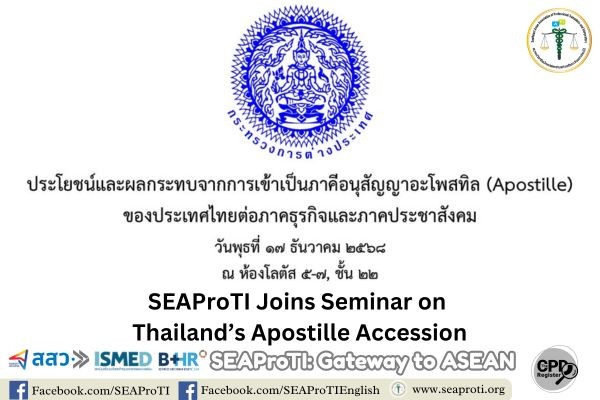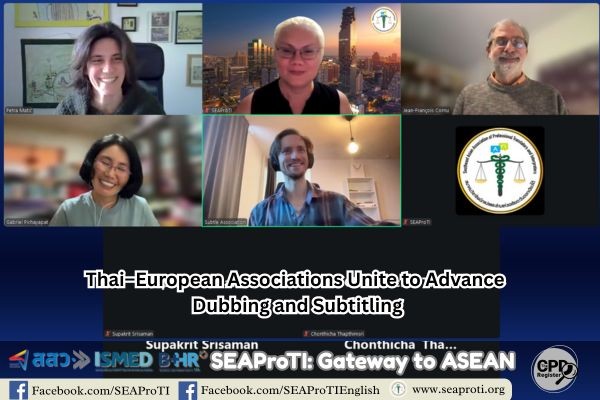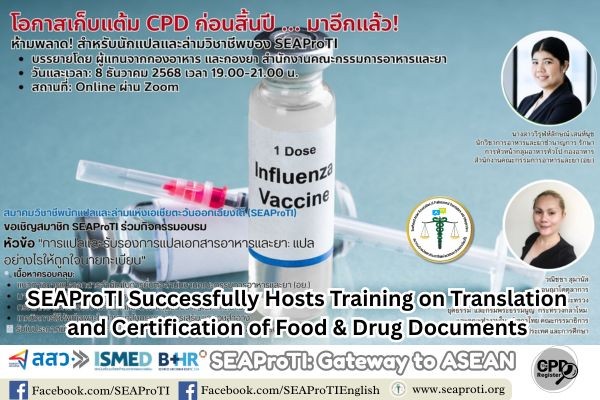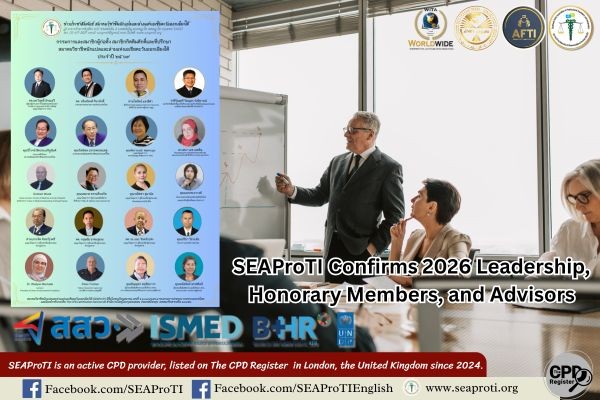Certified Translators and Translation Certification Providers of SEAProTI: A Professional Guarantee for Research Translation and Publication
Abstract
In an era where research demands accurate and credible cross-linguistic communication, the role of translators is indispensable—particularly in the context of academic publication in international journals. This article argues that using the official license issued by the Southeast Asian Association of Professional Translators and Interpreters (SEAProTI) for certified translators and translation verifiers offers a more appropriate and trustworthy approach than relying solely on course completion certificates. The SEAProTI system ensures professional standards, traceability, and ethical accountability, thereby enhancing the credibility of academic translations used in scholarly publishing.
1. Introduction
Publishing research in international contexts, especially in English-language journals, requires translations that are accurate in both language and academic content. However, many translated manuscripts submitted for publication rely only on course completion certificates, which do not always guarantee the quality or accuracy of the translation (Wright, 2022). This article advocates for the use of licenses issued by professional organizations such as SEAProTI to raise the credibility and standard of academic translations.
2. Differences Between Translation Course Certificates and SEAProTI Licenses
A translation course certificate merely proves that a person has attended a course or training session, most of which lack standardized testing or centralized quality control. In contrast, the SEAProTI translator license is issued only after candidates pass rigorous competency-based exams aligned with professional standards. Additionally, license holders must renew their status periodically to maintain active professional standing (SEAProTI, 2024).
3. The Role of Translation Verifiers: Enhancing Academic Trustworthiness
SEAProTI also authorizes “Translation Verifiers,” who are qualified professionals responsible for certifying that a translation accurately reflects the original source and is suitable for academic or official use. This process is akin to peer review in academic publishing (Cho & Lee, 2023). Each certificate includes the translator’s and verifier’s registration number, enabling institutions to verify their credentials through SEAProTI’s database.
4. Relevance to International Research and Publication
Translations that have been professionally certified and verified significantly reduce the risk of content distortion, which can otherwise lead to misinterpretation of research findings or journal rejections (Hamel, 2007). Leading academic journals in databases such as Scopus and Web of Science often require language accuracy and subject-matter precision—both of which can be ensured through certified translation backed by a professional licensing body.
5. Policy Recommendations and Best Practices
To improve the global competitiveness of Thai research, government and funding agencies such as NRCT or MHESI should consider requiring that translations accompanying international research submissions be certified by a licensed translator and verifier registered with a professional body like SEAProTI.
6. Conclusion
Licenses issued by SEAProTI for certified translators and translation verifiers represent a high level of professional competency and ethical accountability. Especially in the context of academic publishing, such licenses offer verifiable assurance of translation quality. The inclusion of traceable credentials and formal examination further strengthens the credibility of the translated content, making it a preferred standard for the academic community in Thailand and beyond.
References
- Cho, Y., & Lee, S. (2023). Academic publishing and translation accuracy: A review of institutional practices. Journal of Scholarly Communication, 11(1), 45–62. https://doi.org/10.1234/jsc.2023.045
- Hamel, R. E. (2007). The dominance of English in the international scientific periodical literature and the future of language use in science. AILA Review, 20(1), 53–71. https://doi.org/10.1075/aila.20.06ham
- SEAProTI. (2024). SEAProTI Professional Certification Guidelines for Translators and Verifiers. Southeast Asian Association of Professional Translators and Interpreters.
- Wright, S. (2022). Translation and Research Integrity: The Role of Certified Translators in Multilingual Publishing. Language and Science Studies, 14(3), 102–119.
SEAProTI’s certified translators, translation certification providers, and certified interpreters:
The Southeast Asian Association of Professional Translators and Interpreters (SEAProTI) has officially announced the criteria and qualifications for individuals to register as “Certified Translators,” “Translation Certification Providers,” and “Certified Interpreters” under the association’s regulations. These guidelines are detailed in Sections 9 and 10 of the Royal Thai Government Gazette, issued by the Secretariat of the Cabinet under the Office of the Prime Minister of the Kingdom of Thailand, dated July 25, 2024, Volume 141, Part 66 Ng, Page 100. the Royal Thai Government Gazette
ใบอนุญาตนักแปลรับรองและผู้รับรองการแปลของ SEAProTI: หลักประกันคุณภาพการแปลเพื่อการตีพิมพ์งานวิจัย
บทคัดย่อ
ในยุคที่การวิจัยต้องอาศัยการสื่อสารข้ามภาษาอย่างถูกต้องและน่าเชื่อถือ บทบาทของนักแปลจึงมีความสำคัญอย่างยิ่ง โดยเฉพาะในบริบทของการตีพิมพ์งานวิจัยในวารสารวิชาการระดับนานาชาติ บทความนี้เสนอให้การใช้ใบอนุญาตของ “นักแปลรับรอง” และ “ผู้รับรองการแปล” จากสมาคมนักแปลและล่ามมืออาชีพเอเชียตะวันออกเฉียงใต้ (SEAProTI) เป็นแนวทางที่เหมาะสมและเชื่อถือได้กว่าการใช้เพียงใบประกาศจบหลักสูตรการแปลทั่วไป เนื่องจากเป็นระบบที่มีมาตรฐานวิชาชีพชัดเจน ตรวจสอบย้อนกลับได้ และมีระบบจรรยาบรรณที่มีผลผูกพันทางวิชาชีพ
1. บทนำ
การตีพิมพ์งานวิจัยในระดับนานาชาติ โดยเฉพาะในวารสารภาษาอังกฤษ จำเป็นต้องใช้การแปลที่ถูกต้องทั้งในเชิงภาษาและเนื้อหาวิชาการ อย่างไรก็ตาม งานแปลจำนวนมากที่แนบไปกับเอกสารตีพิมพ์ กลับอาศัยเพียงใบประกาศนียบัตรการอบรม หรือหลักสูตรทั่วไป ซึ่งอาจไม่เพียงพอสำหรับการยืนยันคุณภาพของงานแปล (Wright, 2022) บทความนี้เสนอให้มีการใช้ใบอนุญาตจากองค์กรวิชาชีพอย่าง SEAProTI เพื่อยกระดับความน่าเชื่อถือของการแปลทางวิชาการ
2. ความแตกต่างระหว่างใบประกาศหลักสูตรการแปล และใบอนุญาตของนักแปลรับรอง
ใบประกาศหลักสูตรการแปลเป็นเพียงหลักฐานแสดงการเข้าร่วมอบรม ซึ่งส่วนใหญ่ไม่ได้มีการสอบวัดสมรรถนะ หรือการควบคุมคุณภาพโดยหน่วยงานกลาง ในขณะที่ใบอนุญาตนักแปลรับรองของ SEAProTI เป็นผลจากกระบวนการสอบจริงที่วัดทักษะการแปลตามเกณฑ์มาตรฐานวิชาชีพ และยังต้องต่ออายุใบอนุญาตตามรอบเวลาเพื่อคงสถานะวิชาชีพ (SEAProTI, 2024)
3. ระบบผู้รับรองการแปล: การเสริมความน่าเชื่อถือในงานวิชาการ
ผู้รับรองการแปล (Translation Certification Providers) ของ SEAProTI เป็นบุคคลที่ได้รับอนุญาตให้ลงนามรับรองว่าเอกสารแปลนั้นมีความถูกต้องตรงตามต้นฉบับและเหมาะสมต่อการนำไปใช้ในบริบทวิชาการ ซึ่งเป็นกระบวนการที่คล้ายกับ peer review ในการตีพิมพ์งานวิจัย (Cho & Lee, 2023) การมีชื่อและหมายเลขสมาชิกของผู้รับรองแสดงอยู่บนเอกสาร ช่วยให้วารสารหรือหน่วยงานสามารถตรวจสอบย้อนกลับได้ผ่านระบบสมาชิกของสมาคม
4. ความเหมาะสมในงานวิจัยและการตีพิมพ์ระดับนานาชาติ
การแปลที่ผ่านการรับรองจากนักแปลมืออาชีพ และได้รับการตรวจทานโดยผู้รับรองการแปล ช่วยลดโอกาสเกิดความคลาดเคลื่อนของเนื้อหา ซึ่งอาจนำไปสู่การตีความผิดในผลวิจัย หรือการปฏิเสธจากวารสาร (Hamel, 2007) วารสารชั้นนำในกลุ่ม Scopus หรือ Web of Science มักให้ความสำคัญกับความถูกต้องของเนื้อหาทางภาษาและเนื้อหาเฉพาะทางเป็นพิเศษ ซึ่งการมีใบรับรองการแปลจากองค์กรวิชาชีพช่วยสร้างความเชื่อมั่นให้กับบรรณาธิการและผู้ทรงคุณวุฒิที่ประเมินงานวิจัย
5. ข้อเสนอเชิงนโยบายและแนวปฏิบัติ
เพื่อยกระดับคุณภาพงานวิจัยของไทยในเวทีสากล ควรส่งเสริมให้หน่วยงานสนับสนุนการวิจัย เช่น สกสว. หรือ สกอ. กำหนดให้การแปลเอกสารประกอบงานวิจัยที่ใช้ในการตีพิมพ์หรือส่งเสนอต่อหน่วยงานต่างประเทศ ต้องแนบใบรับรองจากนักแปลรับรองหรือผู้รับรองการแปลที่มีใบอนุญาตจากองค์กรวิชาชีพ เช่น SEAProTI
6. สรุป
ใบอนุญาตของนักแปลรับรองและผู้รับรองการแปลจาก SEAProTI เป็นหลักฐานที่สะท้อนถึงความเชี่ยวชาญและจรรยาบรรณวิชาชีพของนักแปล โดยเฉพาะในบริบทของการแปลเพื่อการตีพิมพ์งานวิจัยระดับนานาชาติ การมีระบบตรวจสอบย้อนกลับ พร้อมการประเมินทักษะอย่างเข้มข้น ช่วยเสริมความน่าเชื่อถือของเอกสารแปลอย่างมีนัยสำคัญ และควรได้รับการสนับสนุนให้ใช้เป็นมาตรฐานในวงการวิชาการไทย
บรรณานุกรม
- Cho, Y., & Lee, S. (2023). Academic publishing and translation accuracy: A review of institutional practices. Journal of Scholarly Communication, 11(1), 45–62. https://doi.org/10.1234/jsc.2023.045
- Hamel, R. E. (2007). The dominance of English in the international scientific periodical literature and the future of language use in science. AILA Review, 20(1), 53–71. https://doi.org/10.1075/aila.20.06ham
- SEAProTI. (2024). SEAProTI Professional Certification Guidelines for Translators and Verifiers. Southeast Asian Association of Professional Translators and Interpreters.
- Wright, S. (2022). Translation and Research Integrity: The Role of Certified Translators in Multilingual Publishing. Language and Science Studies, 14(3), 102–119.
เกี่ยวกับนักแปลรับรอง ผู้รับรองการแปล และล่ามรับรองของสมาคมวิชาชีพนักแปลและล่ามแห่งเอเชียตะวันออกเฉียงใต้
สมาคมวิชาชีพนักแปลและล่ามแห่งเอเชียตะวันออกเฉียงใต้ (SEAProTI) ได้ประกาศหลักเกณฑ์และคุณสมบัติผู้ที่ขึ้นทะเบียนเป็น “นักแปลรับรอง (Certified Translators) และผู้รับรองการแปล (Translation Certification Providers) และล่ามรับรอง (Certified Interpreters)” ของสมาคม หมวดที่ 9 และหมวดที่ 10 ในราชกิจจานุเบกษา ของสำนักเลขาธิการคณะรัฐมนตรี ในสำนักนายกรัฐมนตรี แห่งราชอาณาจักรไทย ลงวันที่ 25 ก.ค. 2567 เล่มที่ 141 ตอนที่ 66 ง หน้า 100 อ่านฉบับเต็มได้ที่: นักแปลรับรอง ผู้รับรองการแปล และล่ามรับรอง


